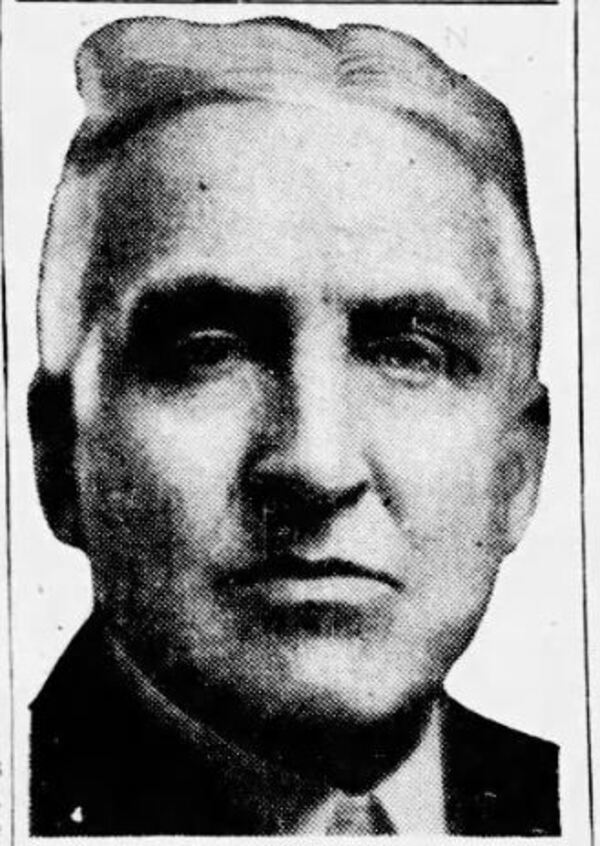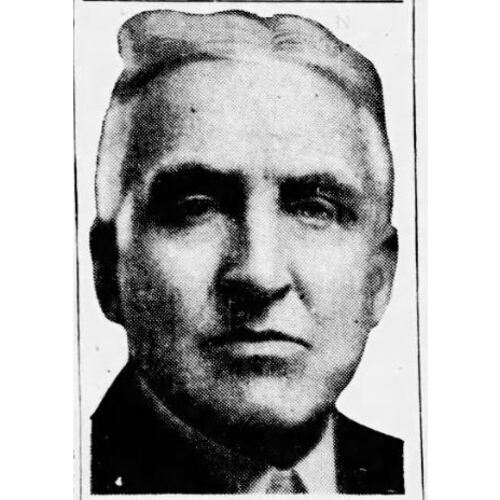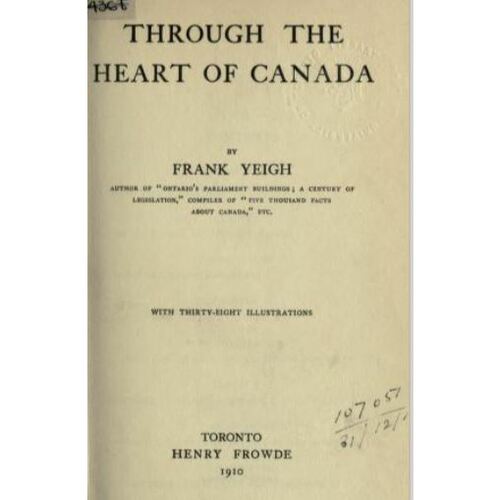
Source: Link
YEIGH, FRANK, printer, publisher, writer, lecturer, publicist, and civil servant, b. 21 July 1860 in Burford Township, Upper Canada, son of Edmund Lossing Yeigh and Adaliza (Ada) Whitehead; m. first 27 Oct. 1892 Kate Eva Westlake* (1856–1906) in Toronto; they had no children; m. secondly 2 Sept. 1908 Annie Louise Laird in Kingston, Ont., and they had one son; d. 2 Oct. 1935 in Toronto and was buried there in Mount Pleasant Cemetery.
Of Pennsylvania German and Scottish ancestry, Frank Yeigh was a lifelong autodidact, remembered in the Canadian Alpine Journal for being “thorough but not ambitious”; he was a prolific author but had only modest impact. He was intrigued by technology such as the printing press, phonograph, and stereopticon projectors, all of which he used in his career as a publicist and speaker. Yeigh believed it was the responsibility of Canadians to support the British empire, sentiments that were likely influenced by his family’s record of military service. His principal achievements were assisting youths and awakening in others an interest in Canada and its history. Convinced of the value of social service, he was instrumental in establishing the Save the Children Fund in Canada.
Frank Yeigh’s curiosity about publishing was sparked early on, when his family acquired a used printing press and he and his brother Henry began producing the “Burford Pioneer” on the family’s farm. After completing elementary school, Yeigh worked as a printer’s devil at the Brantford Expositor and then went to Chicago, where he acquired shorthand and learned more about publishing. In his late teens he moved to Toronto and launched his self-publishing career as editor of the short-lived Canadian Illustrated Shorthand Writer in 1880. That same year he went to work as a registrar under Arthur Sturgis Hardy*, then mpp for Brant South. In 1887 Yeigh worked to publish the weekly Canadian Advance, a magazine of earnest miscellany that lasted about a year. From 1903 onwards he also released an annual booklet, 5000 Facts about Canada, which federal immigration officials purchased in apparently enormous numbers. They may have been sent abroad to be distributed to prospective immigrants.
Under Hardy, Yeigh continued to write and publish, often in an official capacity. In 1890 Hardy asked him to publicize the remote land around Rainy River, which Yeigh did in The Rainy River District, province of Ontario, Canada. Three years later he produced a history, Ontario’s parliament buildings; or a century of legislation, 1792–1892, for the opening of the province’s new legislative buildings at Queen’s Park [see Kivas Tully*]. After premier Sir Oliver Mowat* retired in 1896 and was succeeded by Hardy, Yeigh was promoted to registrar of crown lands.
Early in the 1890s Yeigh had begun to court writer Kate Eva Westlake, whose anonymously published dime-store novel about Chief Sitting Bull [Ta-tanka I-yotank*], Sitting Bull’s white ward (New York), achieved considerable renown in the United States in 1891. They would marry in October 1892. In January that year he hosted, in Toronto, an evening focused on Canadian literature. It was sponsored by the Young Men’s Liberal Club, of which he had recently become president. The program featured William Wilfred Campbell*, William Douw Lighthall*, Agnes Maule Machar*, and Duncan Campbell Scott*. He also invited Emily Pauline Johnson*, who had published two poems in 1889, to give a recital. Her performance proved so successful that Yeigh organized a second event for her in February. He acted as her promoter and publicist until 1894, when she secured the services of a professional manager. Yeigh would continue to support her, as he did a year later, when he defended her against criticism in the Week. Until her death, Pauline Johnson remained deeply appreciative of the efforts on her behalf by the person she called her “Yeigh-man.”
Yeigh became increasingly involved in politics, current events, and civic engagement. He published principally works about Canadian history and biography. He also conducted tours to Niagara to view War of 1812 sites and, as literary correspondent on the executive of the Canadian Club of Toronto, he forged a program for the placement of historical plaques. In 1901–2 he served as treasurer of the Ontario Historical Society and, in 1903, was appointed vice-consul for Paraguay in Toronto.
A keen traveller, Yeigh attended the Chicago Columbian exposition of 1893 and went to Europe the next year. In 1906, after the death of his first wife, he headed west to British Columbia, where, as a member of the Alpine Club of Canada (ACC), he hiked in Yoho National Park. There, amongst “God’s hills,” as Yeigh described the Rocky Mountains in the inaugural issue of the Canadian Alpine Journal, he met Annie Louis Laird, a schoolteacher almost 20 years his junior and a friend of Elizabeth Parker [Fulton*], who was a founder of the ACC. He and Annie married two years later and her inheritance freed Yeigh to leave the civil service. The pair remained active for the rest of their lives, and Yeigh wrote and lectured extensively about his journeys, often using the latest technology, including a stereopticon projector that he employed on the public-speaking circuit. In 1910 he shared his impressions of the country in Through the heart of Canada, a book designed for British and American readers. As he made clear, Yeigh delighted in Canada as a land of civil liberties and economic opportunities that welcomed newcomers who could help forge a new “Canadianized” and “cosmopolitan” country. Yet the concentration of Asians on the west coast gave him pause. He thought that “the Oriental … has his own virtues and vices, his own ineradicable beliefs and manners, his own point of view,” and therefore “it seems certain that [he] cannot be assimilated.”
When conscription was imposed in 1917 by the Union government of Sir Robert Laird Borden, Yeigh, who supported the measure, joined the War Lecture Bureau, operated by the Department of Public Information, and became its national organizing secretary. The bureau’s purpose was to counter German propaganda. In addition to carrying out his administrative role, Yeigh wrote and delivered lectures and penned speeches for other members of the organization. As a liberal nationalist who supported Canada and the British empire, Yeigh argued that the conflict was a proving ground for Canadian democracy.
Yeigh and his first wife had been members of Bloor Street Presbyterian Church, where in 1892 he began a Bible class for young men that proved popular. They had also been active in the Young Men’s Christian Association, for which he produced a booklet on immigration in 1911. After the war he and Annie joined the “Forward Movement,” an evangelical organization adopted by the Presbyterian and other churches with the goal of renewing idealism in young people who had been disillusioned by the conflict.
When their only son was a teenager, Frank joined the National Boys’ Work Board of the Religious Council of Canada, which promoted physical activities for male adolescents. It was a familiar role. Yeigh was a member of the board of the Toronto YMCA, and nearly 30 years earlier he had begun a large young men’s Bible class at his church. His novel approach, which encouraged student participation and social consciousness, influenced countless individuals, such as the jurist James Chalmers McRuer*.
The British Save the Children Fund was founded in 1919, and Yeigh, joined by Annie, helped to establish a Canadian committee in Toronto in 1922. Three years later he became the committee’s organizing secretary. The institution assisted children who had been affected by the war, and Yeigh, who served as its correspondent to Britain, published a number of articles about children caught in global conflicts. After his death in 1935, Annie assumed his responsibilities. The Save the Children Fund became a separate Canadian body in 1946, and it has proved to be Frank Yeigh’s most enduring legacy.
Copies of most items in Frank Yeigh’s extensive body of work can be found at the AO. His most important publications include The Rainy River District, province of Ontario, Canada … (Toronto, 1890); Ontario’s parliament buildings; or, a century of legislation, 1792–1892: a historical sketch (Toronto, 1893); 5000 Facts about Canada, (Toronto), 1903?–34?; One thousand facts about Canada (Toronto, [1906?]); “Canada’s first alpine club camp,” Canadian Alpine Journal (Winnipeg), 1 (1907), 47–57; Through the heart of Canada (Toronto, 1910); Educating the coming Canadians ([Toronto, between 1911 and 1914]); and “The span of a Canadian generation,” Empire Club of Can., Addresses (Toronto), 1913: 238–49. He also published or produced several short-lived magazines, notably the Canadian Illustrated Shorthand Writer (Toronto), May 1880–August 1881, and the Canadian Advance (Toronto), 1887–90.
Ancestry.com, “Ontario, Canada, deaths and deaths overseas, 1869–1949,” Frank Yeigh, 26 Oct. 1935: www.ancestry.ca/search/collections/8946 (consulted 19 March 2024). AO, F 1085 (Frank Yeigh fonds); RG 80-5-0-201, no.015242; RG 80-5-0-376, no.009156. LAC, MG30-C187, vol.8, file 368 (Robert Boyer Inch fonds, League of Nations Soc., corr., Yeigh, Frank); R233-35-2, Ont., dist. Brant South (159), subdist. Brantford (A), div. 7: 56; R1867-0-3; R5181-0-2; R10811-0-X; RG76-I-A-1, vol. 356, file 396503 (Frank Yeigh, Toronto, Ontario, pamphlet “5000 facts about Canada”; mfm. copy available at heritage.canadiana.ca/view/oocihm.lac_reel_c10260, image 1134). Presbyterian Church in Can. Arch. (Toronto), Committee on the Forward Movement records, 1919–23. Queen’s Univ. Arch. (Kingston, Ont.), Annie Louise (Laird) Yeigh fonds. TRL, Marilyn & Charles Baillie Special Coll. Centre, Biog. scrapbooks, 6: 735; 9: 62. Globe, 28 Oct. 1935. Toronto Daily Star, 28 Oct. 1935. Week (Toronto), 22 Feb., 1 March 1895. M. E. Cameron, “‘How the dominion heard the cry’: the early history of the Canadian Save the Children Fund, 1922–1946” (ma thesis, Univ. of Guelph, Ont., 2001). “Frank Yeigh: an appreciation,” Canadian Alpine Journal (Winnipeg), 24 (1936), 115–16. Charlotte Gray, Flint & feather: the life and times of E. Pauline Johnson, Tekahionwake (Toronto, 2002). The hour of prayer: a book of fifty-two prayers for use in the home, comp. Mrs Frank Yeigh [K. E. Laird] (n.p., 1921). R. C. Muir, The early political and military history of Burford (Quebec City, 1913). PearlAnn Reichwein, Climber’s paradise: making Canada’s mountain parks, 1906–1974 (Edmonton, 2014). Veronica Strong-Boag and Carole Gerson, Paddling her own canoe: the times and texts of E. Pauline Johnson (Tekahionwake) (Toronto, 2000).
Cite This Article
Terry Crowley, “YEIGH, FRANK,” in Dictionary of Canadian Biography, vol. 16, University of Toronto/Université Laval, 2003–, accessed February 22, 2026, https://www.biographi.ca/en/bio/yeigh_frank_16E.html.
The citation above shows the format for footnotes and endnotes according to the Chicago manual of style (16th edition). Information to be used in other citation formats:
| Permalink: | https://www.biographi.ca/en/bio/yeigh_frank_16E.html |
| Author of Article: | Terry Crowley |
| Title of Article: | YEIGH, FRANK |
| Publication Name: | Dictionary of Canadian Biography, vol. 16 |
| Publisher: | University of Toronto/Université Laval |
| Year of publication: | 2025 |
| Year of revision: | 2025 |
| Access Date: | February 22, 2026 |




